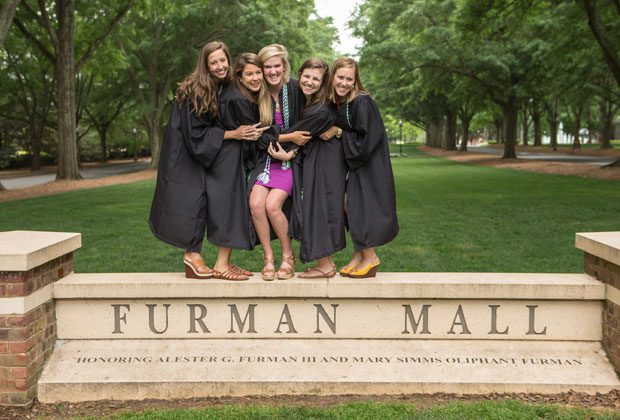Furman grads enjoy high job placement

by Erikah Haavie, Contributing Writer
Eli Loflin began his job search about a month before graduation. As a chemistry major, Loflin had a general idea of what he wanted to do.
“I knew I wanted to work in a lab environment, but I knew I had to be very open-minded about job opportunities,” said Loflin, who graduated from Furman in May. “It was a bit overwhelming.”
With the help of his professors, Loflin was able to make contact with a Furman alumnus working at Milliken and Co. in Spartanburg. By July, he had landed a high-tech job in Milliken’s research and development lab, developing polymeric colorants used in polyurethane foams and synthetic leather.
“It’s amazing. Everyone I work with is an innovator,” said Loflin. “I get to use my college education on a day-to-day basis.”
Furman alumni are continuing to find success with their career goals, in either obtaining employment after graduation or gaining admission to the graduate school of their choice.
“Our students do extremely well,” said John Barker, director of Furman’s Career Services office. “Furman has a reputation for producing quality graduates.”
Furman has an enviable placement rate of 96 percent of graduates either finding employment or entering graduate school within six months of graduation, a rate that has stayed steady in recent years.
Fifty-six percent of 2011 graduates entered the job market after graduation, accepting jobs in 25 states across the country and 11 different countries around the world.
For economics majors, their “real world” experience begins long before graduation. When a student declares an economics or mathematics-economics major, they receive a copy of the department’s “jobs book,” which tells about what recent graduates have chosen to do with their degrees, said professor and department chair Ken Peterson.
Courses focus on developing a set of analytical and quantitative reasoning skills that can be applied to a broad array of careers in business, government and the not-for-profit sector. Job shadowing, visiting with alumni and completing internships have all been helpful tools as students finish their studies at Furman, Peterson said.
Atlanta native Brittany Stokes began her job search in January 2012, about four months before graduating with bachelor’s degrees in psychology and music.
“I looked on many vague job postings sites online, but after getting absolutely no response to my job requests, I decided to look elsewhere,” Stokes said.
A friend referred her to Hope Reach, a branch of the Hope Foundation, a non-profit organization that seeks to supply quality educational care to children with autism.
Networking is an important part of the job search for Furman graduates. Just over 87 percent of 2011 graduates found employment through networking with family, friends, professional contacts or direct employer contact.
Hope Reach turned out to be a perfect match for Stokes. Furman’s Career Services office assisted her with editing her resume. Two days after faxing over her resume, Stokes was hired. She now works as an applied behavioral analysis therapist, providing one-on-one therapy for children and teaching them communication, social interaction, play skills, verbal imitation, eye contact and educational skills.
“I have absolutely loved my job from the very beginning. That is not to say it’s without its difficulties, but I love watching them grow and learn and I genuinely celebrate all of their small steps forward,” Stokes said. “Also, who doesn’t want to play for a living?”
(photo by shutterstock)